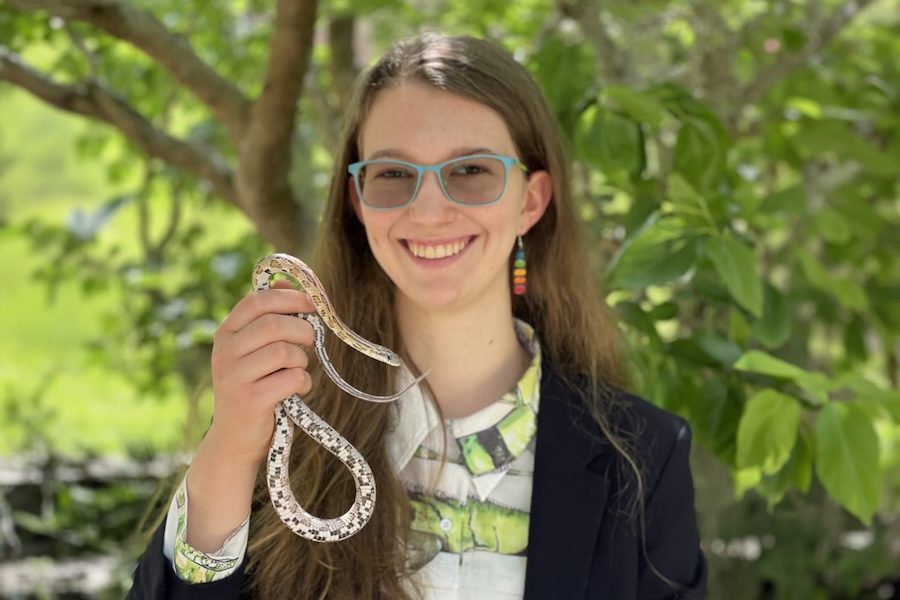Student Spotlight: Nicole Povelikin

Nicole Povelikin is a Florida State University senior pursuing a degree in biological science through the Department of Biological Science, part of the College of Arts and Sciences. She was one of 30 prospective first-year students selected in 2021 by the Presidential Scholars Program, FSU’s preeminent undergraduate scholarship. Povelikin researches the ecology and evolution of reptiles and amphibians, and she earned a 2023 Barry Goldwater Scholarship, which supports students researching natural sciences. Povelikin also earned a Tyler Fellowship from the Tyler Center for Global Studies, funding her research on biofluorescent frogs in Ecuador.
Tell us a little about your background and what brought you to FSU
I grew up in New York City, longing for an environment with more frogs and snakes. In high school, I began research in the reptile and amphibian collection at the American Museum of Natural History. While the collection’s specimens were long dead, I was drawn to their mysteries and stories. FSU offered me the opportunity to continue unraveling these scientific mysteries while immersed in the frog and snake-filled environment just off campus.
What inspired you to pursue a degree in biological science?
I decided I wanted to be a reptile and amphibian biologist in elementary school. In middle school, I learned about evolutionary theory and was instantly captivated. Evolutionary biology makes sense of the beautiful world surrounding us. The more sense we can make of our world, the better prepared we are to save it.
What do you want the public to know about your research? Why are your topics important?
My research characterizes reptile and amphibian diversity so conservation priorities can be more effectively set. Evolutionary adaptations in reptiles and amphibians can be extremely beneficial, some even inspiring biomedical advances — including advances in hypertension drugs from snake venom research and tissue regeneration advances from axolotls, a Mexican salamander that retains its aquatic larval form throughout life.
Unfortunately, reptiles and amphibians are particularly vulnerable to changes in habitat, climate and disease. Since researchers are only beginning to understand the effect of human-driven change, estimating extinction risk and preventing loss of diversity is challenging.
How has being a Presidential Scholar aided your research?
From exploring the halls of the American Museum of Natural History to crocodile infested streams in Panama, FSU’s Presidential Scholars Program has given me the support to pursue my many research interests. I‘ve studied how changes in humidity affect the hatching time of red-eyed tree frog embryos and how historic climate change affects the genetic diversity and habitat distribution of frogs. Through financial support and networking opportunities, this scholarship has allowed me to study complex interactions between human culture and the often-misunderstood animals we share Earth with.
Tell us about earning the 2023 Barry Goldwater Scholarship.
With the scholarship’s support, I’m currently investigating the evolutionary history of ringneck snakes — harmless, black snakes with an orangish belly and collar. Ringneck snakes live underground across North America. In Tallahassee, these snakes are small enough to be mistaken for a worm. Further west, however, they grow big enough to eat other snakes and lizards! Ringneck snakes’ wide variation in ecology, body size, and diet makes them excellent for studying environmental adaptation and speciation.
Tell us about earning a Tyler Fellowship for your project, “Fluorescent Frog Ecology: Microhabitat and Natural History Correlates of Macroevolutionary Biofluorescence Diversity,” in 2023.
Biofluorescence, which creates a glow in the dark appearance by absorbing light and re-emitting it at longer wavelengths, was first discovered in a frog in 2017. This raised a question: why do frogs glow? With support from the Tyler Fellowship, I traveled to assist researchers at the Pontifical Catholic University of Ecuador with my mentor, doctoral student in ecology and evolution Courtney Whitcher, who is a pioneer in her field of study and describes biofluorescence in the amphibian world. I documented the diversity of variation in biofluorescent patterns and noted biofluorescence in species it was not previously identified.
What aspects of your research do you find most rewarding?
Being a researcher means that I’m something new every day. Some days I’m a writer, coder or even a photographer. I spend some days in the molecular lab and others in Florida swamps. I visit museum collections to prepare specimens, run behavioral experiments in the lab, read quietly in the library, and have lively debates with my mentors. Through these ever-changing roles, I am constantly learning, and nothing is more rewarding than that.
What are some current goals or projects that you’re working on?
I co-founded FSU’s Association of Herpetologists and Entomologists, an organization dedicated to connecting FSU students with wild reptiles, amphibians and invertebrates in the Tallahassee area. Many people find these organisms to be scary, making it difficult to obtain support for their conservation. AHE plans trips for FSU students of all majors and experience levels to meet native wildlife in a safe and inclusive environment — including night hikes, snake searches and frogging events.
Are there any faculty or staff who have helped or inspired you?
Upon arriving at FSU, I was kindly welcomed into the Moriarty Lemmon Lab by principal investigator and professor of biological science Emily Lemmon and professor of scientific computing Alan Lemmon. My research wouldn’t be possible without their support alongside excellent mentorship from professor of biological science Emily DuVal, who taught me to recognize the bird calls around me. Another key to my research successes was taking Philosophy of Biology with professor of philosophy James Justus. I thank him for entertaining excellent theoretical debates with me.
Even though you might miss FSU, what are you looking forward to postgraduation?
I’m planning to apply to an evolutionary biology doctoral program and am excited for whatever adventures graduate school brings. I look forward to reading more research papers and finding new ways to ensure our planet’s future is shared with many incredible reptile and amphibian species.
